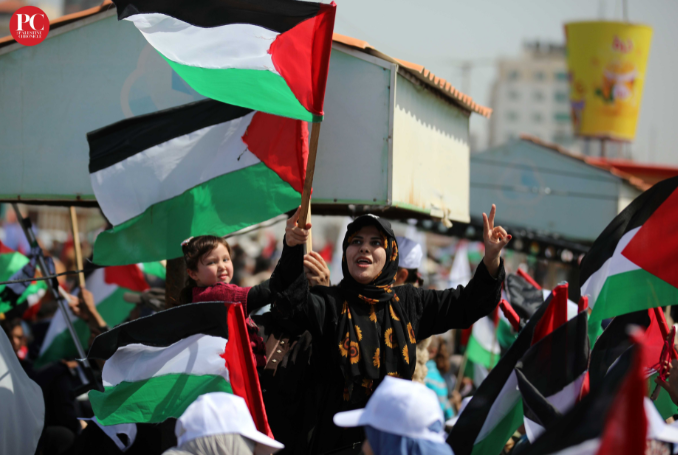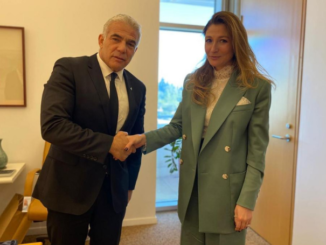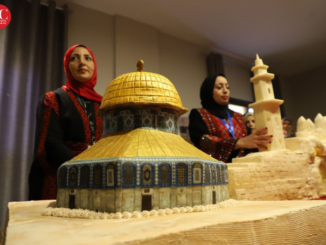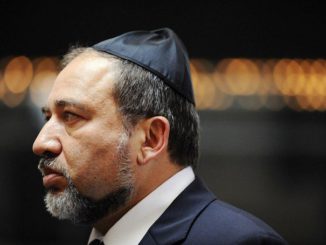
By Benay Blend
For Palestinians, existence is resistance, as it is for other colonized cultures.
On May 15, 2024, Palestinians will commemorate Nakba 76 during what some are calling worse than the first disaster in 1948. “Entire neighborhoods have been wiped out by the occupation, which left behind a great deal of destruction after its withdrawal.
These are not the camps we know, where we have lived since the Nakba (catastrophe) of Palestine in 1948,” said Hajjah Wafa al-Taweel upon returning in late February to Nuseirat camp. “This is a new Nakba, even harsher than the first catastrophe of Palestine.”
Moreover, whole families have been lost. “The occupation killed my mother and my brother Nabil, who was injured two months ago in a neighboring shop while he was working.
They also killed my sisters and a large number of displaced people who sought refuge in our house,” Ahmed Abu Sultan grieved. “No one from my family is left except me and my father, who is suffering from cancer, and my brother who is lying in the intensive care unit receiving treatment for the effects of the bombing.”
As of December 31, 2023, the number of Palestinians killed in 2023 had been the largest since the Nakba (catastrophe) of 1948. According to the Palestinian Central Bureau of Statistics, 98 percent of the dead are from the Gaza Strip, including nearly 9,000 children and 6,450 women. On that date, there were 7,000 reported missing, and over 1.9 million displaced from their homes.
As of May 11, there are 34,971 wounded, 78,541 wounded, and 11,000 missing. The numbers just keep rising.
Israeli officials have shown no qualms in calling for a second Nakba. “We are now rolling out the Gaza Nakba,” said Avi Dichter, Israel’s minister of agriculture and former head of Shin Bet. “Gaza Nakba 2023. That’s how it’ll end.”
None of this is new, as many would like to claim. In The Ethnic Cleansing of Palestine (2006), Israeli historian Ilan Pappé explains that the Hagana’s Plan Dalet sought to forcibly evict the Palestinian population and prevent them from returning to their villages (p. xii).
While Pappé concludes that “there is a moral imperative to continue the struggle against the denial of the crime,” (p. xv), it could be added that there is a moral need to view Palestinians not only as victims but also survivors of 76 years of daily Nakbas that they have resisted in different ways.
For Palestinians, existence is resistance, as it is for other colonized cultures. Several years ago when I taught American history at the local community college there were students who claimed that Native Americans no longer existed, given that they were defeated by the dominant culture. No matter that there were Indigenous students in their classes; they simply did not see them.
It must have taken some courage for those Native students to not only show up but to speak up in the face of others who wanted to erase them. For Palestinians, too, existence is a form of resistance, thus giving the Nakba an alternative meaning of hope, renewal, and joy.
In the process, Palestinians do more than just exist; they look for beauty where they can find it—in the jasmine plant, in the music of the flute—as the late poet Mahmoud Darwish explains in a poem quoted in the title.
In “Erasure vs. Sumud: How the Nakba Came to Define the Collective Palestinian Identity,” journalist/writer Ramzy Baroud defines erasure as it relates to Palestinians: “the systematic destruction of Palestine, its history, culture, language, memory and, of course, people.”
Israel’s attempts to erase the Palestinian people—both literally and figuratively—continues to this day, perhaps most visible in its escalation of genocide in Gaza. Its tentacles extend far beyond the areas that it is physically destroying, as Zionists seek to silence exilic Palestinians and their supporters.
On April 26, Samidoun international coordinator Charlotte Kates spoke at a rally held in Vancouver, British Columbia, during which she said “Long live October 7,” a phrase that affirms the right of Palestinians to self-defense. For that, the Vancouver Police Department charged her with alleged “hate speech.”
As the Canada Palestine Association (CPA) notes, Kates and her husband Khaled Barakat had been the target of the Zionist lobby in Canada before October 7. They have been pushing the federal government to place Samidoun on the country’s terrorist list for several years, despite its important work in advocating for Palestinian prisoners who are currently being tortured in Israeli jails.
Indeed, there has been an increased effort on the part of the Zionist lobby and some liberals to delegitimize the Palestinian resistance, especially the factions that are armed. “Dividing Palestinians from this aspect of the national liberation struggle,” reads a Samidoun statement in support of Kates, “and steering the solidarity movement away from understanding and supporting armed struggle is a key strategic objective of zionism and imperialism.”
The media followed suit. “The New York Times coverage of the Israeli carnage in Gaza,” Ramzy Baroud observes, “like that of other mainstream US media, is a disgrace to journalism.”
In addition to publishing stories about Hamas beheading babies and raping Israeli women on October 7, information that has been debunked time and time again, The Intercept made public a recently leaked memo exposing the ways that the NYT has been issuing “guidelines” to its reporters concerning what to say, what not to say, about the Israeli genocide destroying Gaza.
None of this is new. While anti-slavery advocates like William Lloyd Garrison believed that southerners could be shamed into freeing all their slaves, the Black abolitionist Frederick Douglass rejected this approach.
Breaking with Garrison, he moved to Rochester, New York where he published The North Star, his own newspaper that would publish the truth about slavery, which he knew first hand, and the armed resistance that it would take to end it.
“We must make him (the slave owner) feel that there is death in the air around him,” Douglass said, “that there is death in the pot before him, that there is death all around him.” Douglass himself did not participate in armed resistance, partly because his friends believed that he was too valuable to risk his life that way, but he used his newspaper to print the truth.
“To us, to liberate our country, to have dignity, to have respect, to have our mere human rights, is something as essential as life itself,” the late revolutionary/writer Ghassan Kanafani said, thus reiterating Darwish’s words, that Palestinians seek life when they can find it, but there must first be liberation.
In another vein, activist/writer Susan Abulhawa claims that “the narratives of sumud (steadfastness), courage and heroism are just another form of dehumanization, the sort that makes the world believe Palestinians can endure anything.”
Gaza has been described as an open air concentration camp, but Abulhawa says that the “conditions are worse now than the term implies.” The tents that displaced people have exchanged for their demolished homes are like ovens, she explains, and the latest cause of death is heatstroke.
Despite the endless list of afflictions caused by Israel’s siege, Abulhawa writes that “people remain eager and resolved to rebuild.”
Indeed, as Ruwaida Amer notes, some tents have been turned into classrooms where a large number of university graduates are helping children with their lessons. Broken doors are turned into chalkboards, tents have been turned into school rooms.
For an ancient people like Palestinians, with roots older than Israel, Abulhawa concludes that victory will soon be theirs. This year it is particularly crucial that the Nakba serve as a day of mourning past and present tragedies, but also a time to celebrate life and culture that is rooted in a land whose existence pre-dates the Zionist state.
Last year, hundreds of Palestinians participated in a commemoration of the Nakba in front of the United Nations headquarters in Gaza City. Mahmoud Al-Zeq, a high-ranking member of the Political Bureau of the socialist group, the Popular Front for the Liberation of Palestine (PFLP), said that despite on-going catastrophes, the Palestinians remain defiant.
He concluded that “the Palestinian people have been tirelessly resisting the Israeli invasion, and that they will never forgive and will never forget the dozens of brutal massacres that were committed against them; nor will they forget their land, cities, and villages from which they were displaced by the (Zionist) massacres committed against them.”
“As we navigate through the tragic stories coming out of Gaza,” Afaf Jabiri writes, “the life of a Palestinian unfolds as a paradox – a delicate equilibrium between enduring suffering and embodying steadfast resistance.”
It reminds her of Darwish’s poem: “And we love life if we find a way to it. We dance in between martyrs and raise a minaret for violet or palm trees,” a tribute to Palestinian suffering and endurance.

– Benay Blend earned her doctorate in American Studies from the University of New Mexico. Her scholarly works include Douglas Vakoch and Sam Mickey, Eds. (2017), “’Neither Homeland Nor Exile are Words’: ‘Situated Knowledge’ in the Works of Palestinian and Native American Writers”. She contributed this article to The Palestine Chronicle.








For Palestinians, existence is resistance. I think it’s well past time to establish in the public’s mind that occupation is terrorism. I’ve just been looking at the international legal instruments on terrorism, since that’s a topic about which there’s heaps of obfustication:
https://legal.un.org/cod/books/english/terrorism_handbook_vol1.pdf
https://legal.un.org/cod/books/english/terrorism_handbook_vol2.pdf
With any luck they might serve the Native Americans and others as well.